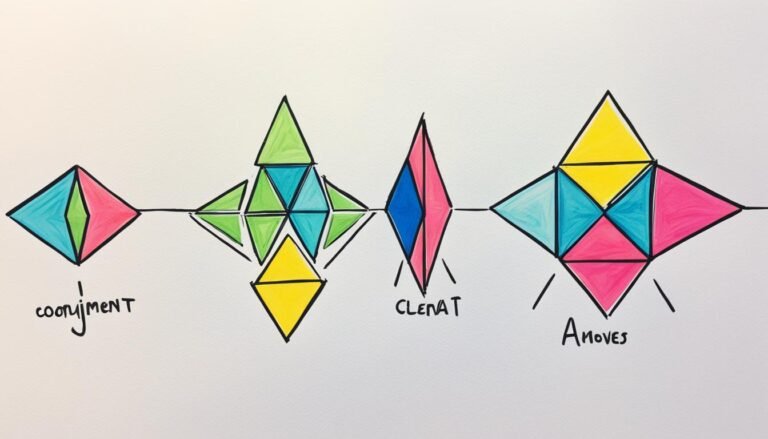Emotional Intelligence: Navigating Emotions with Wisdom and Compassion
“Emotional intelligence is the ability to recognize, understand, and control our emotions. It affects how we relate to others and ourselves. This skill guides our learning and helps us prioritize. It strongly influences our daily choices. Some studies show it drives up to 80% of our ‘success’.” – Daniel Goleman
This article dives into Emotional Intelligence, which affects many areas of life. From how we communicate to our potential as leaders, it’s key. Learning about Emotional Intelligence helps people handle emotions wisely and with kindness.
Key Takeaways:
- Emotional Intelligence is a critical skill that influences our thoughts, feelings, and actions.
- Developing Emotional Intelligence can lead to success in various areas of life.
- Emotional Intelligence allows individuals to understand and manage their emotions effectively.
- Practicing Emotional Intelligence fosters better communication and deeper connections with others.
- Emotional Intelligence is a valuable asset for leadership, motivation, and personal growth.
What is Emotional Intelligence?
Emotional Intelligence helps people handle their feelings wisely. It’s important for growing both personally and professionally. By understanding Emotional Intelligence, we learn how to know our feelings, control them, understand other’s feelings, be good at socializing, and stay motivated.
Being aware of our own emotions is the starting point. This means we notice our feelings and how they affect us and those around us. Recognizing our emotions helps us make better choices.
Emotional intelligence is crucial for personal and professional victories. It helps people manage their feelings and understand others better. – Daniel Goleman
Self-regulation
Self-regulation is about managing our emotions well. It means keeping our feelings in check and not letting them control us. This helps us act wisely in tough times, which is great for relationships and growing as a person.
Empathy
Empathy lets us feel for and with others. It’s key in relating to people, showing care, and forming strong bonds. To build empathy, we must listen well, understand others’ points of view, and deal with them kindly and gently.
Social Skills
Having good social skills means you can talk, work, and bond with others effectively. It’s crucial for getting through social challenges, solving problems, and team success. Working on your social abilities boosts your Emotional Intelligence, helping in your personal and job life.
Motivation
Our motivation links closely with Emotional Intelligence. It pushes us towards goals and keeps us focused. By using our emotions wisely, we can stay motivated to face and beat any hurdle that comes our way.
Emotional Intelligence is essential in many aspects of life, including leading, talking, and feeling good. Improving our Emotional Intelligence makes us better leaders, communicators, and people. This leads to more happiness and success in every part of our lives.
The Importance of Emotional Awareness
Emotional awareness is key to understanding emotions and their impact. It helps us know our feelings and why we react the way we do. This means we can learn more about ourselves and how our emotions shape our lives.
Knowing our emotions lets us handle them wisely and with care. We learn not to judge our feelings but to accept them. This way, we deal with our feelings in a positive way and can make better choices.
By being emotionally aware, we can spot what makes us feel certain ways. We then can learn to cope better with these feelings and find healthier ways to handle them.
Being in touch with our feelings can also make us better at understanding others. It allows us to really feel their emotions. This makes our bonds stronger and helps us communicate and build deep relationships.
Getting better at understanding our emotions is something we work on all our lives. It takes looking inwards and accepting all emotions we go through. Try being mindful and paying close attention to how your feelings change in different situations.
Emotional awareness is a big part of being emotionally intelligent. It helps us deal with our feelings better and know ourselves and others more deeply.
Key Takeaways:
- Emotional awareness is a key part of being emotionally intelligent.
- It’s about knowing our own emotions and why they happen.
- This skill helps us react to our feelings in positive ways.
- It also makes our connections with others stronger.
- To get good at emotional awareness, we need to reflect and stay present.
Mastering Self-Regulation
Self-regulation is key in Emotional Intelligence. It helps people handle their feelings well. This makes sure they stay calm in tough times.
Learning to control your emotions lets you face them with kindness. Strong self-regulation skills help you under stress without losing focus. They also help in making choices that match your values.
There are tricks to get good at self-regulation. Let’s look at a few:
- Awareness and acknowledgment: Start by noticing your feelings. Check in with yourself often. Know what you’re feeling throughout the day.
- Breathing exercises: Taking deep breaths helps calm you down. It can make you feel more balanced. Try breathing from your diaphragm when you’re upset.
- Pause and reflect: Don’t act right away when you’re very emotional. Take a moment to think. Then, you can make a clear choice.
- Seek support: Talk to someone you trust when you’re upset. This can give you new ways to see the issue. It might make you feel better.
Self-regulation isn’t a one-time fix; it takes work and patience. With practice, you’ll get better at handling your feelings. This will make you better at relating to yourself and others.
Keep reading to learn about empathy and its part in Emotional Intelligence.
The Power of Empathy
Empathy is key to Emotional Intelligence, making our connections deeper. By feeling and understanding others, we build compassion. This skill is vital in both personal and work life.
When we’re empathetic, we get how others feel and respect their point of view. This creates trust and cooperation. It leads to better talks and work together.
Empathy lets us understand someone else’s world. It knocks down walls of misunderstanding. This brings people together and makes places more welcoming.
With empathy, we make life better for us and those near us. It helps us solve problems with kindness. This strengthens bonds and helps us grow emotionally.
“Empathy is about standing in someone else’s shoes, feeling with his or her heart, seeing with his or her eyes. Not only is empathy hard to outsource and automate, but it makes the world a better place.” – Daniel H. Pink
Enhancing Empathy Skills
To be better at empathy, start by really listening. Try to understand how others feel and why. This means paying full attention, no judging, and not interrupting.
It’s also about seeing things from different viewpoints. Imagine what it’s like for others. This deepens your understanding of their feelings and why they act a certain way.
Empathy means we look at our own judgments, too. It’s about finding and fixing our biases. This leads to being more open-minded. It helps others feel they can be themselves around us.
The Ripple Effect of Empathy
Empathy’s impact goes beyond individuals. When many people are empathetic, it changes societies. It builds connections and unity.
By being empathetic, we help make the world kinder. Every small act of understanding matters. It inspires others to be caring, too.
Remember, empathy is something we can get better at. Using it daily makes us emotionally smarter. Together, we can build a world where empathy is at the heart of everything.
Enhancing Social Skills
Social skills matter a lot in connecting with others. They help express feelings and ideas clearly. These skills make talking and working with people better. They also teach us to see things from another person’s point of view. This is key for good relationships.
Good social skills help in all kinds of places, like at home, work, or in groups. They let you talk well, understand body language, and really listen.
Social smarts are needed to get along with different types of people. They help us show we care, solve problems, and make teamwork happen.
To get better at social skills, practice listening, understanding others, and speaking up kindly. Know your own feelings and how to handle them. This makes interacting with others smoother.
Working on social skills is a big plus. It helps build strong relationships and do well in groups. These skills are key for a happy and successful life, both at home and at work.
Good leaders know how vital social skills are. They build strong teams through listening and making real connections. This helps everyone work together to reach common goals.
Building Meaningful Connections
Enhanced social skills lead to strong relationships. These relationships offer support, mentorship, and growth opportunities. Being real, caring, and a good listener can help build powerful and lasting bonds, in both personal and professional life.
Getting better at social skills is a journey worth taking. It helps you reach your full potential and positively influence others. Remember, improving your emotional intelligence is a lifelong process.
Motivation and Emotional Intelligence
Getting motivated is key to reaching our goals. Emotional Intelligence (EI) is closely tied to motivation. EI is the skill of understanding and handling emotions well. This includes knowing your emotions and being able to put yourself in someone else’s shoes.
If you boost your EI, you understand yourself and others better. This means you can use motivation more effectively. Motivation is the desire that gets you to act. How we feel, and how we cope with those feelings, plays a big part in motivation.
Folks with high EI are good at pushing themselves. They know what they are good at and what they need to work on. This lets them set smart goals. Having clear goals helps boost their drive.
“EI is like a secret key. It opens the door to finding your own motivation. This helps you jump over hurdles and work hard for success.”
Also, knowing your emotions can help you fight off negative feelings. This can keep you on track towards your goals. It’s about controlling feelings of fear or doubt so you can keep focused.
And here’s the cool part. When you get good at understanding emotions, you also get better at understanding others. This makes your relationships stronger. Having good relationships around you motivates you to keep going.
Mixing EI and motivation helps you reach your maximum potential. You can deal with your emotions, aim for important goals, and beat whatever gets in your way. This keeps you moving forward.
The Science Behind Motivation and Emotional Intelligence
Studies show a strong link between EI and how motivated we are. A Yale University study found people with higher EI are more motivated. They often set and achieve tough goals.
Another study in the Journal of Applied Psychology found EI boosts employee morale and performance. Companies that train their staff in EI see better teamwork, work quality, and job happiness.
By training in EI, you get better at managing your emotions. You learn to see failures as chances to grow. This leads to a more positive attitude towards challenges.
Enhancing Motivation with Emotional Intelligence
To boost motivation through EI, follow these tips:
- Develop self-awareness: Understand your emotions and how they affect your drive. Think about what you’re good at, what needs work, and what matters most to you. Aligning your goals with your values is key.
- Set meaningful goals: Define goals that mean something to you and are doable. Break them into smaller tasks. This way, you stay on track and see your progress.
- Cultivate empathy: Listen and try to see things from others’ points of view. This helps build strong connections and a support group. Good relationships boost your motivation and sense of belonging.
- Manage emotions: Spot and handle negative emotions early on. Use things like deep breathing or being mindful to stay emotionally steady. This can keep your motivation up.
- Celebrate successes: Recognize and celebrate your wins. It can be small things that mark your progress. This boosts your morale and keeps you confident.
By living out EI principles daily, we can improve motivation, drive, and our general happiness. Use Emotional Intelligence to push your personal and work life to the next level.
Emotional Intelligence in Leadership
Emotional Intelligence is key for great leadership. Leaders with high EI inspire their teams and build trust. They make work a place where feelings are understood.
Leading isn’t just about tasks, but also understanding people’s emotions. Leaders with EI connect well with their teams. This helps in building strong and positive relationships at work.
Being able to inspire is a big part of EI in leadership. This means sharing your emotions to drive your team forward. Leaders who know the emotional needs of their team give work a deeper meaning.
Building trust is crucial too. Showing empathy and really listening makes team members feel supported. This trust leads to better communication, teamwork, and courage to take risks.
Leaders who focus on EI create positive work spaces. They care about their team members’ well-being and emotions. This kind of leader helps their team members do their best work.
Benefits of Emotional Intelligence in Leadership
High EI leaders are great at many things. They can motivate teams, build strong bonds, and solve problems with care. They can change how they lead based on each person’s needs.
They are also good communicators and team players. EI makes leaders effective and improves work life. This leads to happier, more engaged employees.
Leadership is about more than giving orders. It’s about understanding your team’s emotions and needs too.
Improving EI is a journey. It takes self-awareness and a desire to keep growing. Leaders who work on their EI skills see benefits in their personal and professional lives.
The Role of Emotional Management
Understanding and managing our emotions is key in our daily lives. It helps us make better choices and keep good connections. With good emotional skills, we can handle tough times with calm and care. This leads to better results in the end.
Knowing ourselves is a big part of emotional control. We must learn what our feelings mean and what sets them off. Then, we can respond wisely, not quickly. Deep down, understanding and accepting our own emotions teaches us a lot about how we think and act.
Another key is handling our emotions the right way. It’s about keeping them in check and showing them healthily. If we do this, we can dodge fights and talk better with others.
“Emotional management is not about suppressing or ignoring our emotions; it’s about understanding them and responding in a way that aligns with our values and goals.” – Daniel Goleman
Good emotional skills help us make smart choices. We think about our feelings, but we also think logically. This mix ensures our actions come from the right place, not just from sudden emotions.
So, how can we get better at this? We can try things like deep breaths, meditation, and writing down our feelings. Also, doing things that make us happy and taking care of ourselves helps a lot.
To sum up, emotional management is crucial in Emotional Intelligence. By handling and understanding our emotions, we boost our lives. We make better choices, build stronger bonds, and live with more peace and care.
Unlocking Your Emotional Quotient (EQ)
Your Emotional Quotient (EQ) measures how well you understand and handle your feelings. It’s key for both your personal life and your career. Let’s explore what EQ is, why it’s important, and how to boost it.
EQ is about sensing, getting, and controlling your emotions well. It includes knowing yourself, understanding others, and being good with people. Having a strong EQ helps in working well with others, making smart choices, and doing well in different settings.
The Significance of Emotional Quotient
A high EQ lets you really grasp how others feel and act appropriately. It leads to better relationships, solving problems, and working well with others.
Boosting your EQ means you become more resilient emotionally. This helps you handle tough times, keep stress at bay, and stay healthy. It also makes you a better leader, inspiring and guiding others.
Enhancing Your Emotional Quotient
Improving your EQ is a continuous process of self-check, practice, and growth. Here’s how you can do it:
- Self-awareness: Think about your feelings, strengths, and what you’re not so good at. Know how your emotions affect your actions and thoughts.
- Emotional regulation: Spot and deal with strong feelings. Learn calming techniques like deep breathing and mindfulness to find your emotional center again.
- Empathy: Work on understanding and caring about other people’s feelings. Really listen to them and let them know their feelings matter.
- Social skills: Get better at talking with others, fixing issues, and working with all kinds of people. Practice really listening, expressing yourself clearly, and caring about others’ points of view.
- Continuous learning: Always look for ways to grow emotionally, like getting feedback, taking classes, and reading about Emotional Intelligence.
Taking steps to improve your Emotional Quotient will boost your Emotional Intelligence as a whole. Start this journey to unleash your emotional abilities and succeed in all parts of your life.
Conclusion
Emotional Intelligence helps people handle their feelings wisely and with kindness. It makes us better at talking, leading, and growing as individuals.
It includes noticing our emotions, keeping them in check, and understanding how others feel. Doing this helps us connect better with people. It also pushes us to work harder and be more successful both personally and at work.
When leaders are emotionally smart, they inspire and support their teams better. They also help create workplaces where everyone feels understood and valued. Wise emotional decisions lead to a happier life too.
Start working on your Emotional Intelligence now to reap its benefits. It will help you deal with tough times, improve your relationships, and live a more meaningful life.








